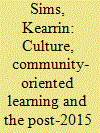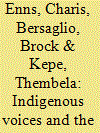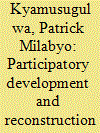| Srl | Item |
| 1 |
ID:
141898


|
|
|
|
|
| Summary/Abstract |
This article critically interrogates current policy-sector approaches to culturally sensitive development and the manner in which culture has been conceptualised within the post-2015 development agenda-setting process. By providing a brief interpretive summary of academic debates surrounding culture and development, an analysis of how ‘culturally sensitive’ practices have been pursued within the policy sector, and an examination of the insufficient consideration given to culturally sensitive development within post-2015 agenda setting, I argue that much uncertainty remains around how to translate complex academic understandings of culture and development into policy responses. Following this, I provide one case study drawn from the small, low-income country of Laos to suggest possibilities as to how culturally sensitive development may be better conceptualised and implemented within a post-2015 global development era.
|
|
|
|
|
|
|
|
|
|
|
|
|
|
|
|
| 2 |
ID:
131356


|
|
|
|
|
| Publication |
2014.
|
| Summary/Abstract |
This paper explores recent efforts to ensure the participation of indigenous peoples in the making of the post-2015 development agenda. It is based on an examination of the UN's global consultation process, conducted between July 2012 and July 2013. Using discursive analysis of consultation findings and reports, we argue that the UN's approach to participatory development represents a pretence rather than an actual shift in power from development experts to the intended beneficiaries of development. Therefore the post-2015 consultation process aptly illustrates the recurring tyranny of participation, this time at a global level, as the UN maintains control over global development goals. Recognising that it would be unjust to ignore the ability of marginalised groups to challenge the UN's dominant narratives of development, we suggest that there is still time for indigenous voices to be heard in the build-up to the post-mdg era through 'invited' and 'uninvited' forms of participation.
|
|
|
|
|
|
|
|
|
|
|
|
|
|
|
|
| 3 |
ID:
122838


|
|
|
|
|
| Publication |
2013.
|
| Summary/Abstract |
In the past decade researchers and development experts have been preoccupied by participatory development and reconstruction. Despite criticisms of its potential, it has been at the centre of development practices. This review of both published and unpublished literature aims to assess the importance of participatory development and reconstruction, especially its positive and negative characteristics. The paper shows that, despite its potentially transformative role, its main drawback rests in the power relations between elites and non-elites and that creating comprehensible ways through which non-elites can deal with these relations is one issue that needs additional research. Other issues that need more research are related to how to sustain the participatory development and reconstruction outcomes by increasing local ownership, and how to better involve existing structures and institutions (both state and non-state actors) in development and reconstruction efforts for poverty alleviation.
|
|
|
|
|
|
|
|
|
|
|
|
|
|
|
|
| 4 |
ID:
143572


|
|
|
|
|
| Summary/Abstract |
Indigenous peoples’ right to prior consultation and to informed consent represents the basis of the new global model shaping state–indigenous relations. Consultation processes promise to enable indigenous people to determine their own development and are especially promoted when extraction projects with significant socio-environmental impacts are planned on indigenous lands. In this article we draw on debates on participatory development in order to analyse the first state-led consultations in Bolivia’s and Peru’s hydrocarbon sectors (2007–14). The analysis shows that effective participation has been limited by (1) an absence of indigenous ownership of the processes; (2) indigenous groups’ difficulties defending or even articulating their own visions and demands; and (3) limited or very general outcomes. The study identifies real-life challenges, such as power asymmetries, a ‘communication hurdle’ and appropriate timing – as well as simplistic assumptions underlying the consultation approach – that account for the unfulfilled promises of this new model.
|
|
|
|
|
|
|
|
|
|
|
|
|
|
|
|